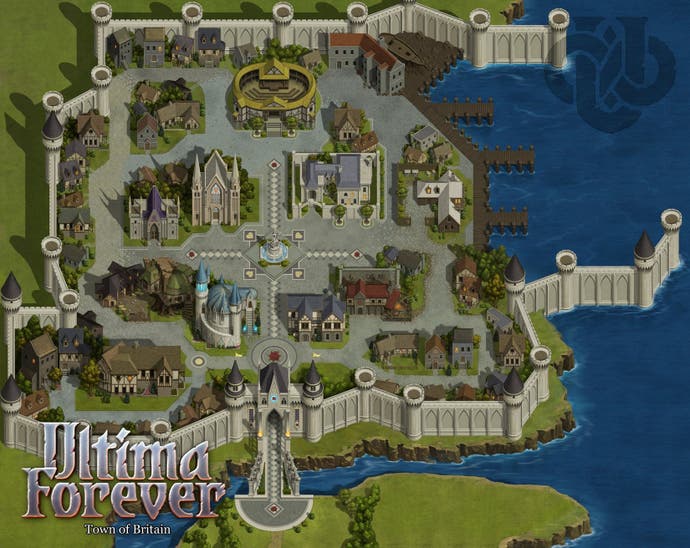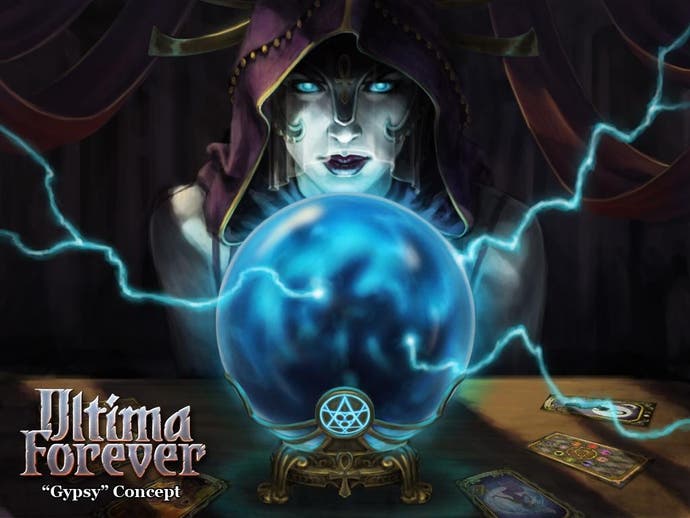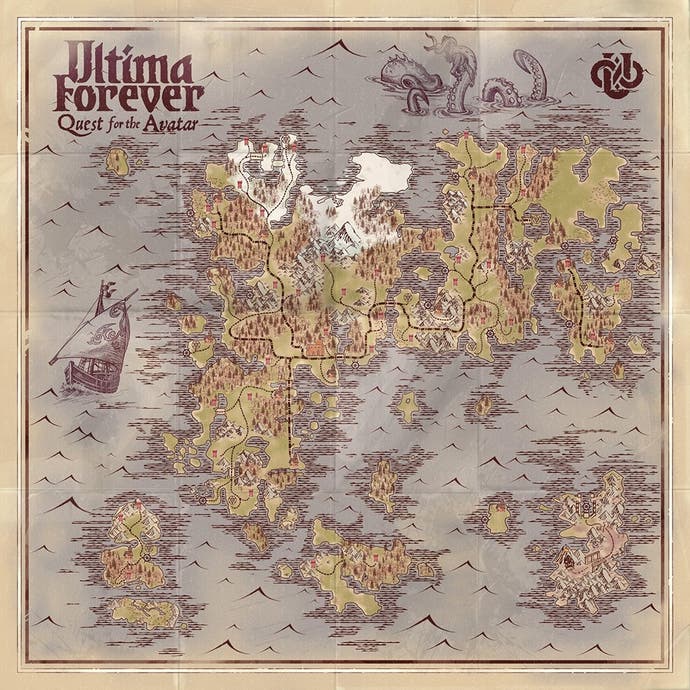Ultima Forever - Interview mit Lead Designerin Kate Flack
"Ein paar Mal mussten wir unseren Stolz herunterschlucken und ein paar Sachen ändern, aber hey, Demut ist eine Tugend, nicht wahr?"
It's very hard to put percentage values on something as flexible and nuanced as story. We certainly started out by mapping out the Quest of the Avatar from Ultima IV to use as the spine of the game. We wanted it so that the player always had at least one quest that matched Ultima IV. We even set aside a special page of the Quest log for the main story that would get you towards becoming an Avatar. We split this main quest into three acts, each with a focus. The first act is dedicated to the principle of Truth, so it's all about learning. This makes sense because it's where the player is learning the game controls, the basic story of the world and discovering the different Virtues.
The Mantras and the Three Part word seemed to fit nicely into that theme so we made these the first part of the Quest for the Avatar that the players would experience. Later on they'll deal with the Tripartate key, the Bell Book and Candle and other quest elements that are familiar to Ultima IV players. Along side these story elements are the quests and encounters that deal with current events in Britannia. For example, Lady British is new to her throne, and some of the Nobles aren't keen on her decision to open the moongates. This has all sorts of consequences that the players can help resolve.

We've reached out to some of the most enduring Ultima fans out there and invited them into our Alpha. We've specifically asked them to give us as much feedback about the lore as possible. There's been a couple of occasions where we've had to swallow our pride and change some things, but hey, Humility is a Virtue, right? By and large, most of the Ultima faithful we've spoken to understand that we're trying to make it so a new generation of people can have that same Ultima moment that they enjoyed.
Ultima Forever is an action RPG. There's no turn based party system or anything like that. Combat works by selecting a target, choosing an ability and having at your foe! Position plays a role in combat. You do lots more damage if you get behind your foe and slightly more if you attack from the side. In multiplayer this creates some interesting scenarios where one person does a frontal attack to occupy the monster and the others flank.
The Virtue system is the heart of Ultima Forever. One half of your character sheet is dedicated to recording how well you are progressing at developing your Virtues. As you play the game you are going to have all sorts of chances to earn experience points that go towards leveling up your Virtues. The people of Britannia know that you're here to help them, so they'll often come to you for advice. We call these encounters 'Quandaries'. An NPC will outline a problem and you'll have three different pieces of advice you can offer.
Each one will correspond to a different Virtue, and very often these will conflict. You might have the choice between doing something kind, something fair or something honest for example. It's up to you as the player to decide what you think the right course of action is. The choice you make will earn you points towards a Virtue level. If you just play as your conscience dictates you'll pretty quickly learn what Virtues are strong within you. Likewise with our branching quests. Some key storylines have Virtue choices that have a longer lasting consequence for your character, such as altering future quests.

Lady British has picked up where Lord British has left off. We don't portray it as 'replacement' more inheritance. It's supposed to be respectful of Richard and his rights, but also symbolic of the 'next generation' theme that runs throughout the game. Ultima Forever will have lots of NPCs familiar to people who have played Ultima IV. From the eight companions to Lord Blackthorn to all manner of minor characters. They may be a little older, and things may have changed in their lives, but they are there for you to meet and talk to. We did this because it wouldn't make sense to have 21 years pass and everyone still be the same. It's been an interesting challenge to think about what would happen to these characters against the backdrop of a failing regency and decline in the Virtues.
That's an interesting question. I don't know about you, but I find the idea of categorizing gamers into neat little boxes of 'hardcore' and 'casual' a bit disturbing. I mean, I play all sorts of games ranging from old school MUDs like 'Legends of Terris', to console games like ''Demons souls' and so on to casual ipad games like ''Dragonvale' and ''Where's the Water?' I don't like to think that my gamer DNA can be boiled down to 'hardcore' or 'casual'. I think people are more complicated than that. Certainly as more people have access to more devices that can play games we're going to see that peoples gaming habits are going to become broader. Instead of thinking about 'hardcore' user segment vs 'casual' segment designers need to think about just making a good game, as this distinction is going to be less and less useful in the future. That's the approach I've taken with Ultima Forever. Make a good game that's easy for anyone to get into, but also don't be frightened of dealing with the depths and complexity of a game that deals with morality.

You can play all the way through the game without spending a dime, but if you decide you do want to spend some money, there is a plethora of things to buy. From vanity items to help you customize your look to healing potions, keys to open chests to early weapon unlocks and xp boosts, there are all sorts of things you can buy. The one thing that you can't purchase is Virtue. The only way to get honour, valour, spirituality and all the over Virtues is to play the game. As the best gear is the game is gated by Virtue, you can't just instantly pay your way to the top. You have to work at it like everyone else.
